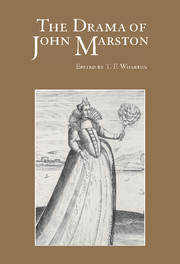Book contents
- Frontmatter
- Contents
- Notes on contributors
- Acknowledgements
- Note on the text
- Introduction
- 1 John Marston at the ‘mart of woe’: the Antonio plays
- 2 John Marston: a theatrical perspective
- 3 Varieties of fantasy in What You Will
- 4 Safety in fiction: Marston's recreational poetics
- 5 Insatiate punning in Marston's courtesan plays
- 6 Touching the self: masturbatory Marston
- 7 ‘Two parts in one’: Marston and masculinity
- 8 The Malcontent: hunting the letter
- 9 The Dutch Courtesan and the profits of translation
- 10 Sexual politics in Marston's The Malcontent
- 11 Marston: censure, censorship, and free speech
- 12 Ill-mannered Marston
- Index
5 - Insatiate punning in Marston's courtesan plays
Published online by Cambridge University Press: 01 October 2009
- Frontmatter
- Contents
- Notes on contributors
- Acknowledgements
- Note on the text
- Introduction
- 1 John Marston at the ‘mart of woe’: the Antonio plays
- 2 John Marston: a theatrical perspective
- 3 Varieties of fantasy in What You Will
- 4 Safety in fiction: Marston's recreational poetics
- 5 Insatiate punning in Marston's courtesan plays
- 6 Touching the self: masturbatory Marston
- 7 ‘Two parts in one’: Marston and masculinity
- 8 The Malcontent: hunting the letter
- 9 The Dutch Courtesan and the profits of translation
- 10 Sexual politics in Marston's The Malcontent
- 11 Marston: censure, censorship, and free speech
- 12 Ill-mannered Marston
- Index
Summary
Examining the critical reception to Marston's dramatic work over the ages, it soon becomes apparent that two points are repeatedly alluded to. Firstly, that the ingenuity and eagerness he applied to extending the English vocabulary have meant that, of all the Elizabethan and Jacobean playwrights, Marston is the one most often accused of lexical histrionics. Frederick Boas commented he had a ‘daring and extravagant vocabulary which might pass within the leaves of a book but which was a provocation to censorious ears when thundered from the stage’. Jonson famously satirized him in Poetaster where, thinly disguised as the character Crispinus, he is forced into vomiting a host of extravagant newly minted words. W. Reavley Gair, writing on Marston's Antonio plays, deduced that ‘by the end of their respective first acts, both plays have introduced a new word to the audience on average every fifteen lines’. Thus we have an image of Marston at the cutting edge of the English language, constantly appropriating newly coined terms and creating his own nonce words to embellish his plays with a daring verbal extravagance. On one level his texts are like linguistic butterfly cases, a place to display exotic words in order to charm and delight his audience. On another, they can be seen as the lexical equivalent of mud-throwing. If enough new words were cast at theatregoers, some would stick and become part of common usage while others would fade into obscurity the moment the play concluded.
- Type
- Chapter
- Information
- The Drama of John MarstonCritical Re-Visions, pp. 82 - 99Publisher: Cambridge University PressPrint publication year: 2001



